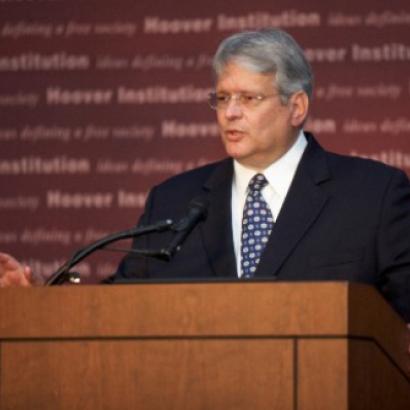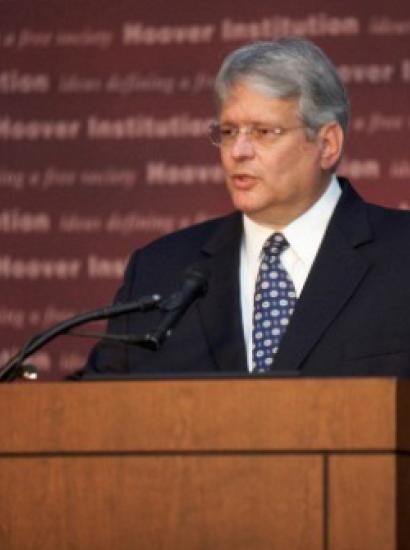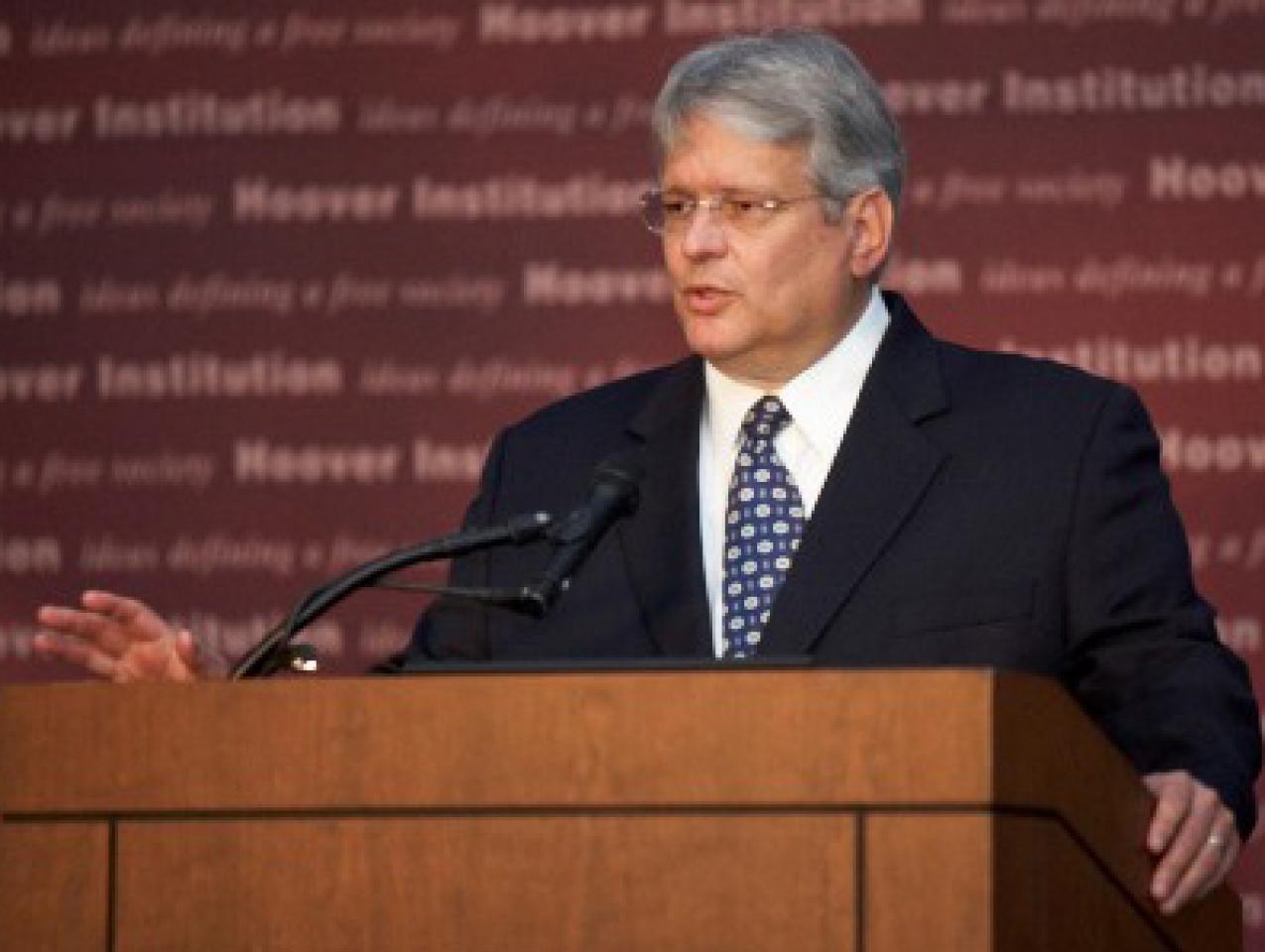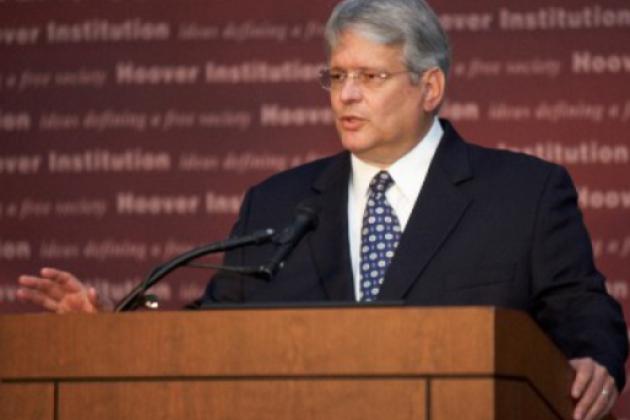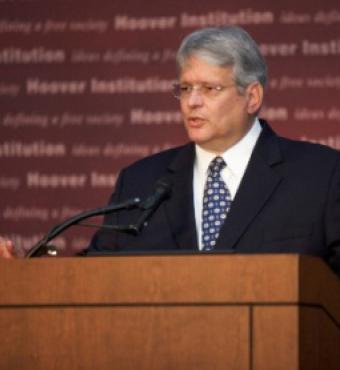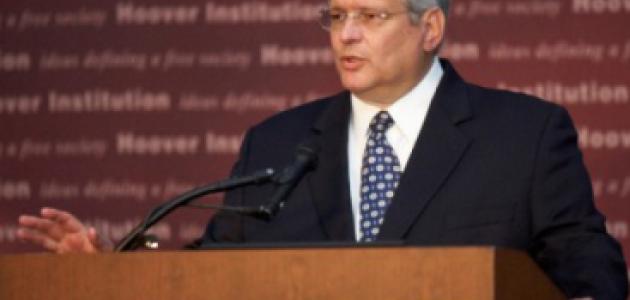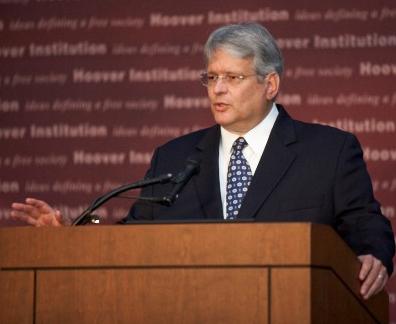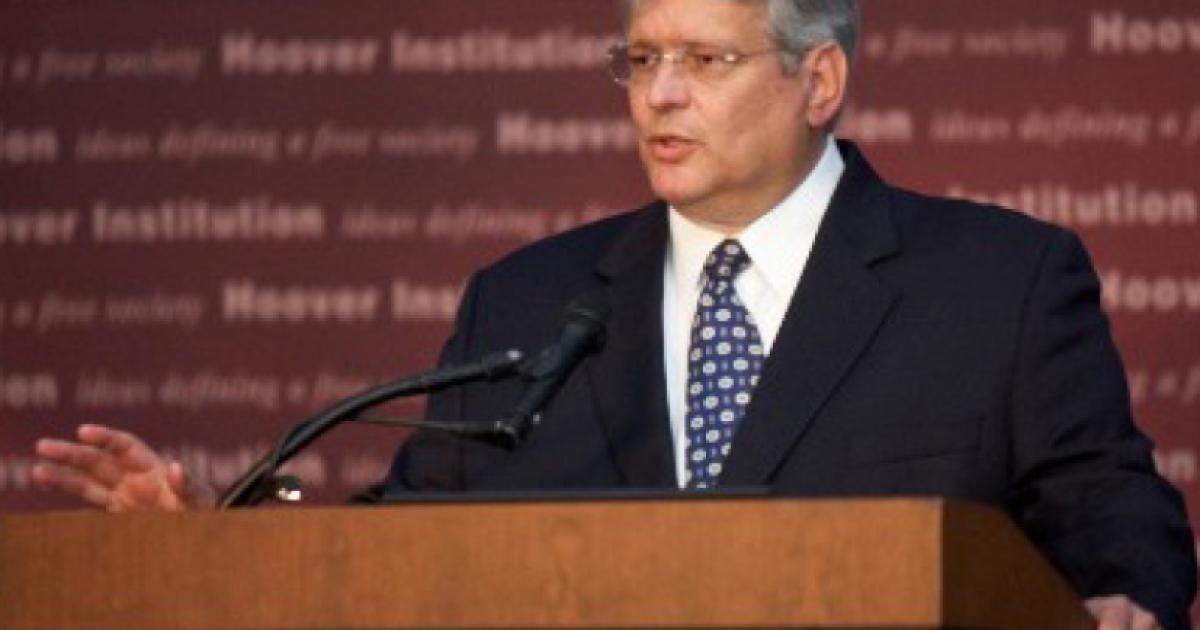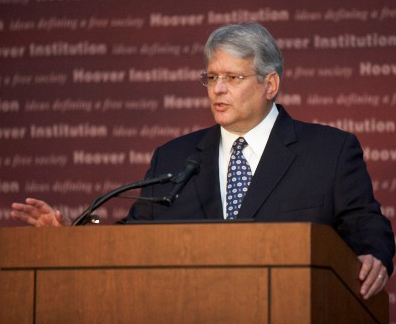
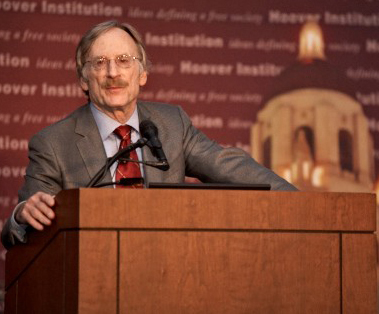
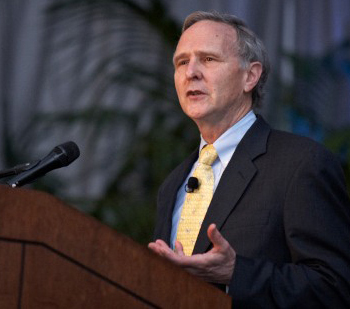
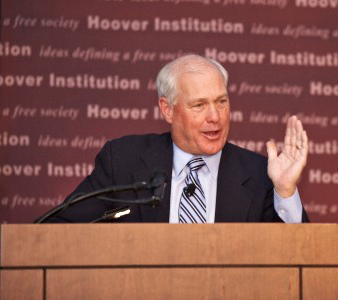
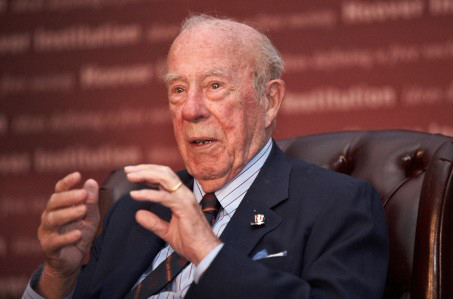
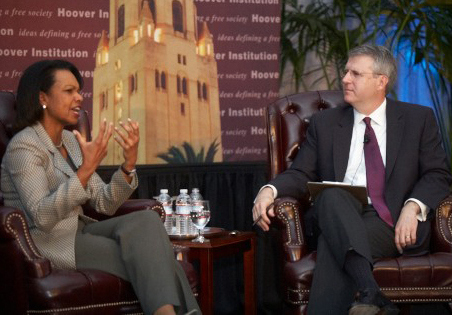
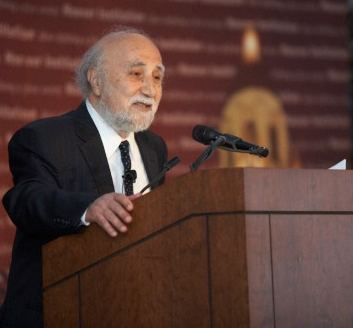
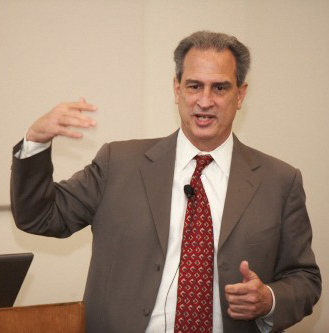
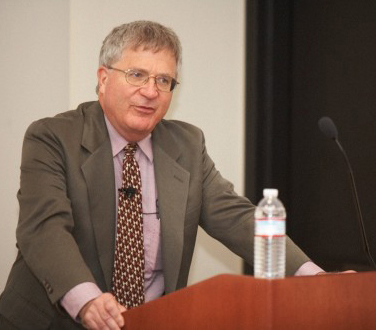
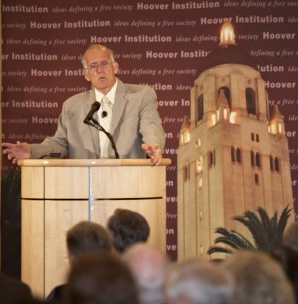
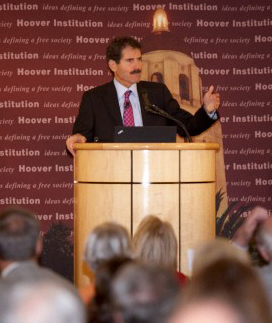
The Hoover Institution Spring 2012 Retreat began on Sunday, April 22, 2012, with before-dinner remarks by John Stossel, a commentator on the Fox Business Network, where he hosts Stossel, a weekly program highlighting current consumer issues from a libertarian viewpoint. Before joining Fox, he coanchored ABC’s prime-time news magazine show 20/20. He discussed his new book No, They Can’t: Why Government Fails—but Individuals Succeed, which depicts Stossel’s ideas of “what we’re imprinted to believe and what reality has taught [him].” Stossel, in talking about how people are unsatisfied with the government today and how the free market system works better for our society, stressed how “central planning appeals to people” and how we are “programmed to follow the central planner.” This does not, however, necessarily work with millions of people. He emphasized the importance of education, the complications of health care, and the hope for change, especially in high school students. “Economic freedom creates prosperity. When government reduces our control over our own lives, our lives are less. Big government makes us smaller. . . . When politicians say ‘Yes we can,’ I have this fantasy that tea party members or you or someone will march on state capitols and hold up a sign that says, ‘No they can’t,’” Stossel concluded.
Victor Davis Hanson, the Martin and Illie Anderson Senior Fellow at the Hoover Institution, gave the before-dinner remarks on Monday, April 23, 2012 in a talk titled “The American Ways of War.” Hanson briefly discussed his previous speeches about the western way of war and continued by explaining the American ways of war. “Within this larger Western landscape, there is a peculiar American way of war because we’re an exceptional country. We have our Constitution to put a greater premium on individual liberty. We’re a multiracial country where we let everybody come in and succeed or fail and [we have] vast technology [advancements],” stated Hanson. He also mentioned that the world critiques us for our mobility and the cyclical ways of war. Employed by Americans during periods of national doubt, isolation, and cutbacks, another avenue of American war is what he called “punitive war,” or “more rubble, less trouble.”
John Raisian, the Tad and Dianne Taube Director of the Hoover Institution, in his welcoming remarks on Monday morning discussed the new exhibition The Battle for Hearts and Minds: World War II Propaganda, Hoover’s electronic media, and the central theme of this retreat: paying tribute to former Hoover senior fellow Milton Friedman by honoring his work and contributions.
Michael Boskin, senior fellow at the Hoover Institution and the T. M. Friedman Professor of Economics at Stanford University, talked about the Nobel Prize–winning Friedman in his speech titled “Beyond Remarkable: Milton Friedman as Scholar and Public Intellectual.” As an undergraduate student of Friedman’s, Boskin recalled reading his noteworthy books. Praising Friedman as a teacher Boskin, quoting from a video clip shown before his speech, reiterated Friedman’s statement: “We need to think of the long run and where we want to be and how we get there.” Boskin recognized Friedman as a scholar, a public intellectual, and for the influence he had on Hoover and Hoover scholars; he then included a personal reflection.
Boskin went on to talk about Friedman’s research on monetary policy, rules versus discretion in conducting monetary policy, the natural rate of unemployment, and the permanent income theory of consumption. Boskin then highlighted Friedman’s major works as a public intellectual, including Capitalism and Freedom, and major policy contributions, including the flat tax, a negative income tax, an all-volunteer army, school choice, education vouchers, and an emphasis on freedom and liberty for their own value and as the basic organizing principles of a successful economy. Friedman, Boskin pointed out, had an enormous influence on Hoover and Hoover scholars and their work, including Robert E. Hall and Alvin Rabushka’s The Flat Tax, John Taylor’s monetary policy rules, and Boskin on taxation. Boskin added that Friedman was “one of the most important economists in the last century.”
Eric Hanushek, the Paul and Jean Hanna Senior Fellow and a member of the Koret Task Force on K–12 Education, examined the issue of school choice in the K–12 education school system in his talk titled “Has the Time Come for School Choice?” Hanushek delineated the main theme of his speech using Milton Friedman’s book Capitalism and Freedom and how it relates to schools. “We might want government to be involved in the funding of schools, but there’s absolutely no reason to think that government has to actually run the schools and this led to the idea of vouchers,” Hanushek stated. He also touched on the Friedman’s notion that licensure professions can cause harm.
Hanushek also discussed what has happened in education since 1962 during the Cold War: fewer students are in private school, resources to schools have increased (the amount of money per pupil has quadrupled), and student performance has remained unchanged. The United States ranks 32nd on the Programme for International Student Assessment (PISA), being average in reading and science and below average in math. Despite these results, Hanushek provided explanations and reasons for optimism, including greatly expanded school choice, a fall in union support, and the rise of “union control.” He went on to describe the current extent of choice in schools, including residential location, open enrollment (within district or within state), magnet schools, homeschooling, and charter schools.
John Cogan, the Leonard and Shirley Ely Senior Fellow at the Hoover Institution and a professor in the Public Policy Program at Stanford University, compared the current financial budget of President Barack Obama and that of US congressman Paul Ryan in his speech titled “A Tale of Two Budgets: Obama vs. Ryan.” Cogan began by talking about the current fiscal situation, including entitlement programs, budget deficits, high unemployment rates, and economic stagnation. He then displayed a chart that depicted Obama’s proposed “same course” plan and Ryan’s “change of course” plan, including “moderately reducing the real size of government” during the next ten years. Under Obama’s budget, “federal expenditures initially decline relative to national income, but they do so only under his [Obama’s] assumption that the economy significantly improves during the next year,” Cogan explained.
The central goal of Ryan’s budget is to reverse the growth of government using three sets of initiatives. The first would repeal all the spending initiatives enacted during President Obama’s first term. The second would be reforming part of the entitlement programs. The third would be to cut, transportation programs, health care services, and education and training programs. Cogan concluded by stating, “We have to recognize our problems if we’re ever going to fix them. Dealing with the current federal budget excesses and the rising implications that loom on our immediate horizon should be the federal government’s highly fiscal priority.”
George Shultz, the Thomas W. and Susan B. Ford Distinguished Fellow at the Hoover Institution, gave remarks in honor of Milton Friedman in his talk titled “Reminiscences on Milton Friedman.” Shultz shared personal stories of experiences in which Friedman gave him advice and direction regarding Shultz’s work in politics and how he met Friedman at the University of Chicago and the personal relationship and friendship they developed. Shultz told stories about problems he had faced as secretary of labor, as the first director of the Office of Management and Budget, and as secretary of the Treasury and the “way in which Milton’s advice helped [him] and you can see, in a sense, the very practical side of Milton Friedman, as a guy who said, here’s the problem, do this, and we can see how it runs.” Shultz then reflected on one of the video clips shown about Friedman. “This tendency for government to intervene is just there all the time because something is happening, it could have bad repercussions, so do something. But often it is the case that if you don’t do something, if you exercise some patience, you get a much better result, than if you do something and garner all the bad side effects.”
The afternoon session began with a plenary session featuring speakers Condoleezza Rice, the Thomas and Barbara Stephenson Senior Fellow on Public Policy at the Hoover Institution, and Peter Robinson, a research fellow at the Hoover Institution and host of Uncommon Knowledge™. Together, Robinson and Rice discussed the state of Iraq, North and South Korea, China, Iran, and Russia. Robinson then asked Rice her views on Republican presidential candidate Mitt Romney and his take on Iran, as well as President Obama’s views on the state of Iran.
Hoover fellows Fouad Ajami, Stephen Haber, and Michael McConnell, participated in breakout sessions on Monday afternoon. Ajami, a senior fellow at the Hoover Institution and the cochair of the Herbert and Jane Dwight Working Group on Islamism and the International Order, gave a speech titled “The Arabs and Freedom’s Ride: To Ride or to Walk?” Haber, the Peter and Helen Bing Senior Fellow at the Hoover Institution, talked on “Where Does Democracy Thrive?: Climate, Technology, and the Evolution of Political Institutions.” McConnell, a senior fellow at the Hoover Institution and the Richard and Frances Mallery Professor and director of the Constitutional Law Center at Stanford Law School, discussed “Health Care in the Courts.”
Following the breakout sessions, two panel discussions were held, one of which, titled “An Economy in Crisis: Looking to Historic Figures to Save the Present,” cohosted by John Batchelor and Mary Kissel along with Hoover fellows Michael Boskin, Russell Roberts, John Taylor and guest Nicholas Wapshott, included a live taping of the John Bachelor Radio Show. The other panel discussion, titled “The American Military: Today’s Circumstances and Tomorrow’s Challenges,” included the 2011–12 National Security Affairs Fellows, led by moderator Hoover fellow Thomas Henriksen. The 2011–12 National Security Affairs Fellows are Mark Cassayre, Michael Chandler, Manuel Hernandez, John Howard, Matteo Martemucci, and Joseph Russo.
Tuesday morning started off with opening remarks by John Raisian, the Tad and Dianne Taube Director of the Hoover Institution, covering housekeeping matters and introducing the morning speakers.
Russ Roberts, a research fellow at the Hoover Institution and a professor of economics at George Mason University, continued the topic of Friedman in his speech “Milton Friedman on the Crisis.” Roberts emphasized the timely classic book Capitalism and Freedom by Friedman, and quoted him from an interview he did with Friedman, shortly before his death in 2006: “The basic principles that we believe in are going to stay the same for the next thousand years.” Roberts remarked on what made Friedman special: “the quickness of his mind, the friendly style, the relentless logic and his ability to communicate the basic principles that we believe in and apply them in ways that are accessible to the rest of us and easy to remember.” Roberts applied some of Friedman’s basic principles to the current financial crisis and state of the economy. Roberts discussed Friedman's dislike of bailouts, and his awareness of how people spend other people's money less carefully than their own. Roberts noted that much of the crisis stemmed from the ability to borrow money and to have little skin in the game, an outcome encouraged by past rescues of creditors of large financial institutions. Roberts talked about how Friedman would have critiqued the performance of the Federal Reserve. Roberts closed by quoting Friedman's insight into political reality: “It’s nice to elect the right people, but that isn’t the way you solve things. The way you solve things is to make it politically profitable for the wrong people to do the right things.”
Edward Lazear, the Morris Arnold and Nona Jean Cox Senior Fellow at the Hoover Institution, touched on the topic of economics in his talk “Taxes and Economic Growth.” Lazear emphasized the importance of the topic of taxes and “the way the government (taxes) affects our lives most importantly and most directly.” He named two key aspects based on Friedman’s teachings including monetarism and focused on the role of government in society, in particular, the importance of having a limited government. He went on to explain two subtopics, the level of taxations and the structure of taxes. Under the first topic of the level of taxation, Lazear explained the Laffer curve and how it works and the difference in government spending over time. Under the structure of taxation, he explained why the VAT tax and the retail tax are not ideal solutions to the fiscal problem. Lazear concluded by reiterating Friedman’s point that “taxes are the way that you increase government expenditures, and government expenditures are the way you slow economic growth so you have to make sure that you control the tax side of the equation.”
Caroline Hoxby, a senior fellow at the Hoover Institution, the Scott & Donya Bommer Professor of Economics at Stanford University and a member of the Koret Task Force on K–12 Education, discussed the winner and loser generations in her speech “How Government Policy Is Creating Winner and Loser Generations—or, What Young People Ought to Be Protesting.” Hoxby discussed how the young people protesting (i.e. Occupy Wall street protestors) have a right to complain, but they are protesting for the wrong reasons. She talked about the intergenerational redistribution which is a powerful phenomenon in which “mature and older generations decided to redistribute to themselves at the expense of younger generations.” Hoxby explained how the 55 and older cohorts have been “grandfathered-in,” which means that these groups of people don’t have to pay that much in taxes or transfers. The younger cohort groups are not “grandfathered-in” and the middle aged cohorts are partially “grandfathered-in.” She explained how the older generations can make the situation better for the younger generations.
John Taylor, the George P. Shultz Senior Fellow in Economics at the Hoover Institution and the Mary and Robert Raymond Professor of Economics at Stanford University, talked about the delayed economic recovery in his speech “Government Policy and the Delayed Recovery.” Before Taylor’s speech, a Milton Friedman clip was played showing Friedman describing the “magic of the price system” with a yellow No. 2 pencil. Taylor began by explaining how he uses that Friedman pencil clip in his introductory economics class at Stanford University. Taylor talked about the more technical parts of Friedman and how Friedman’s ideas are reflected in his upcoming book Government Policies and the Delayed Economic Recovery. He demonstrated the “plucking model” using a guitar and graphs to show how that when the economy is “plucked” down or pulled down, the “string” or the economy always springs back up. When the economy is “plucked” more, the faster the economy goes back up. However, this is not the case in today’s financial recovery, hence the term Taylor uses for the book, “delayed economic recovery.”
Taylor uses graphs to compare two recoveries (1980s, today’s situation) and talks about the excuses for the delayed recovery including ineffective fiscal policy, exploding federal debt, ineffective financial reform, ineffective health care reform, ineffective monetary policy, regulatory explosion, and the measures of unpredictability and the impact of that unpredictability. Taylor concluded by stressing the importance of getting the full story right and how some policies occurred in 2008, were doubled down after 2008, and how the good news is that the problems can be rectified.







